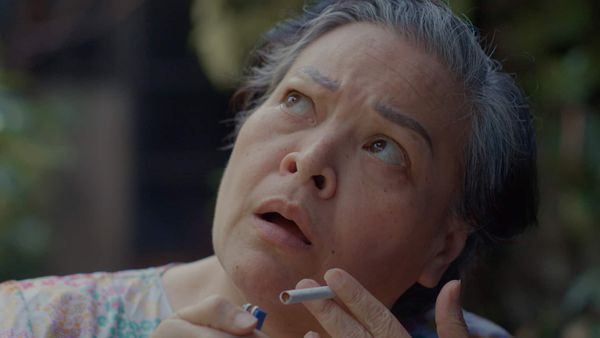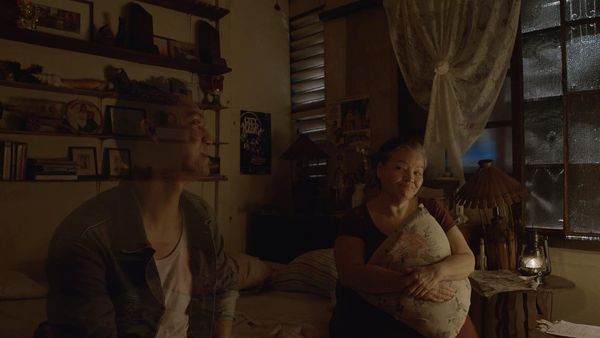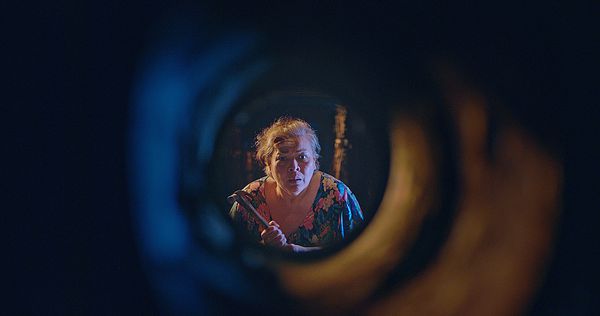The regular world of the film - which opened in New York last week and expands to LA, Chicago and elsewhere this Friday - is left behind by Leonor after an accident which sees her catapulted into the genre film she has written, enjoyably getting in on the action, since she knows exactly what’s coming next. Escobar doesn’t stop there, even making an appearance herself.
When we caught up with the writer/director to chat about the film, she tells us the meta parts involving her weren’t in the original script but were added during the middle of principal photography.
 |
| Martika Ramirez Escobar: ''I think all films and works of art are extensions of their artists' |
A major part of why the film works so well is Francisco’s central performance. An established theatre actress in the Philippines, this was nonetheless her first film role.
Escobar says the producers saw her in a play and asked her for a script read. She adds: “When she read, she felt like an actual person and that was a really good sign. She's a really pleasant person so we got along well so I wanted her to be part of the project from that first meeting. She was one of the last readers of the script. So it was just meant to be when she came into this project.”
In fact, Francisco also had a personal history that helped with the character of Leonor.
Escobar says: “Sheila used to work as a production manager and producer in the advertising industry during the 90s. So she genuinely has a background in production. And that helped a lot. And the stories for us as the production team.”
The director also has a background working as a cinematographer and she admits it “wasn’t easy” to hire someone else to do the DoP work on this project. Carlos Mauricio certainly has plenty to do in terms of maintaining the two very distinct worlds of the ‘normal’ world and the film within a film that Leonor fins herself in.
She adds: “We would collaborate but I couldn't help myself from framing the shots myself. What's good is that my cinematographer Carlos is very open. So he sort of understands where I'm coming from. I'm a very visual person and so most of the time, I would frame first, and then he would light - I wouldn't touch his lights at all. Sometimes I would take the camera myself in the action scenes.
“We have the same vibe. And we also like the same films and images. I picked him because I knew he would understand the aesthetic I was going for. But even Carlos got into the project in our last days of completing the key staff. I initially had a different team two years before principal photography, but many of them backed out because of the limited resources we had for the project. And so it kept on changing until we finally found the right team, who were just willing to go along with the lack of resources.
 |
| Leonor (Sheila Francisco). Martika Ramirez Escobar on casting her: 'When she read, she felt like an actual person and that was a really good sign' Photo: Music Box Films |
That willingness has certainly paid off with the film winning a number of festival prizes and now nominated for the 2023 Independent Spirit Awards for Best International Film.
Even in the real world Leonor inhabits there’s a touch of something otherworldly, courtesy of her dead son.
Escobar explains: “The presence of the ghost is inspired by a true story of my own grandma, who would say of her son, who did pass away, that she would sometimes feel his presence in her bed. And so I just imagined a person actually sitting beside her in the bed and being able to talk to her. Whenever I have problems in this world, I would often imagine my guardian angels, like my grandfather, who passed away, and I would talk to them in my head. It's something I genuinely believe and so I was sure that I wanted it to feel like a real person. So in the film, the ghost is a real person, just translucent.”
She adds that the film was influenced by her grandma more generally.
“I think I never really thought about it while I was writing it but I realised that my grandma is one of the people who redeems my idea that life isn't so bad, after all, because I was a sad, grumpy kid. And whenever I hung out with my grandma, she just saw so much beauty in little things in life, like when we would travel, she wouldn't take pictures of the tourist spots, she would take pictures of the flowers. So it's those tender moments and different perspectives that make me want to make a film about a wise older woman who happens to be inspired by my actual grandmother.”
The film also explores the tension between the idea of the fiction and its creator - something that Escobar relates to.
“I think all films and works of art are extensions of their artists,” sayes Escobar. “So Leonor is also a concretisation of how I see life as one really long film that we keep on writing and revising, until it's complete someday. I couldn't really separate the work from myself now. That's just how I see filmmaking right now. But I also noticed that it keeps on changing as I grow older, the future films I want to make are very far from Leonor.”
Turning to the political dimension of the action, the idea of a star becoming elevated first in movies and then in real life is pertinent to the Philippines, where Joseph Estrada, who had more than 100 film roles on his CV, became president in 1998.
Escobar says: “That's one of the epiphanies when I wrote the film, I was like, ‘Why am I so interested in this?’ And I think I'm interested because feelings affect us so much as people, and then looking at it on a larger scale. When I was growing up, our president was a former action star. And we've had many action star politicians until this very day. And so I've always wondered, what is it about movies that affect us so much, and perhaps it's the feeling of wanting to be saved by an actual action hero on screen? It's the blurring of realities that I'm also experiencing with the films I like. And so I was sure that it was going to tackle that obsession/fascination with onscreen characters as well.
“Even the other socio-political aspects of the film, where the extrajudicial killings are happening, the planting of illegal drugs, these are incidents that happened when I was actually writing and shooting, so I would revise it accordingly on what's happening. And I think films in general, not just action films, really reflect the times and the people and what they're experiencing and what troubles us. And so it just felt right to actually situate it in a time, so it’s more of a reflection of what happened.”
It seems to be a very free and flexible approach to a film, to allow things to morph during shooting rather than sticking to the original script.
“I've always seen the project as a growing project,” says Escobar “I would imagine it as a human and then it has its co-parents, which are my producers, our staff and crew, and then it keeps on growing. And my new discovery is that it still keeps on growing after the film is made. It grows in every screening and every festival and every person who reaches out to us online. So I just like how it feels like it's a lifeform.
“The film also evolved in itself. So in the beginning, it was just two worlds, and it became three worlds. And then, in the end, even my whole team was present in the film. So it's just that giant connection of relationships with people and places.”
Looking to the future, she says: “I still dream of making strange stories but now with more freedom. I also recently enjoyed spontaneous filmmaking scriptless short-list-less films. Films that, from the beginning, are open to growing onset. Because when we started Leonore, I was very rigid. I wanted a script, a shotlist, a live action storyboard, I wanted everything to be planned. And then slowly, as time passed by, I let go of those impulses because I realised that it feels better, to not be so rigid and so controlling. So for the next film, I just imagined it as a free-form film, which also makes it hard to pitch. I’ll most likely make a pitchable version of it - but when we’re shooting it will be free.”
Leonor Will Never Die is currently playing in cinemas in the US, to find a screening near you, visit Music Box Films.























